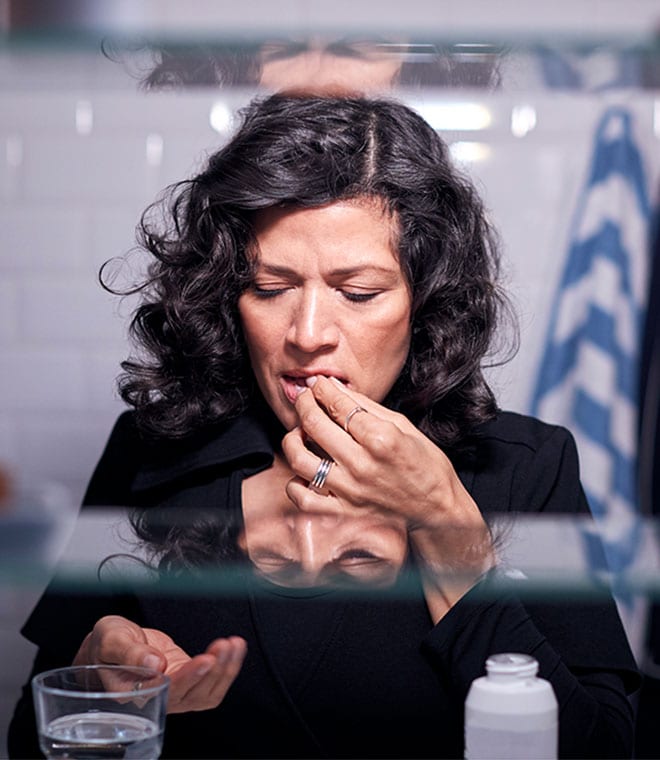Health
Cold sore FAQs: Your questions answered
By Ruben J. Rucoba, MD Sep 10, 2024 • 11 min
If you’ve had a cold sore, you know they can be painful, embarrassing and often impossible to ignore. Also called fever blisters or oral herpes, cold sores are very common. While many people have experienced cold sores, there are still a lot of misconceptions about them, from how they form to the most effective ways to treat them. Here you’ll find answers to some of the most frequently asked questions regarding cold sores.
Are cold sores a type of herpes?
Cold sores are usually caused by the herpes simplex virus type 1 (HSV-1), a common infection that many people get when they are children or young adults. HSV-1 is different from the herpes simplex virus type 2 (HSV-2), which is transmitted sexually and causes genital herpes, though HSV-2 can cause cold sores as well.
Are cold sores contagious?
Yes, cold sores are contagious. The virus is usually spread through contact by kissing or touching someone with cold sores or by sharing objects such as cups, utensils, straws or towels with an infected person. Cold sores can also spread to other people from saliva.
Are cold sores genetic?
No, cold sores are not genetic. They are caused by an acquired infection and are not passed genetically.
Why do you get cold sores?
The virus is usually spread by kissing or touching someone with cold sores or by sharing utensils, drinking cups or glasses, straws, towels or other items with an infected person. Some people can get the herpes virus and not show any symptoms, while other people may have an outbreak of blisters or ulcers.
Can you get genital herpes from a cold sore?
Yes, it is possible to get genital herpes from a cold sore. Cold sores caused by HSV-1 can be spread and cause lesions in the genital area. This can happen if you have a cold sore and engage in oral sex.
Can cold sores spread?
Yes, cold sores can spread to other parts of your body but are usually confined to the lips, gums and other areas of the mouth, as well as the skin around the nose, mouth and chin. Sometimes the virus can cause lesions on the fingertips. This is known as herpetic whitlow and is common in children who suck their thumbs. The virus can also cause infection in the eyes. Cold sores can spread from person to person as well.
Can I pop a cold sore?
Cold sores go through a progression of stages, and early in the process they form blisters, so it is possible to "pop" a cold sore, though this is not recommended. Opening the lesion may cause the fluid to infect other areas of your body.
Can you get a cold sore from stress?
Stress isn't a direct cause of cold sores, but it can trigger a recurrence of cold sores. When you get the herpes simplex virus type 1 (HSV-1) or type 2 (HSV-2), it remains dormant in nerve cells in your body. Sometimes, certain triggers can cause the virus to reemerge. These triggers can include stress, physical injury, surgery, other infections, intense or prolonged sunlight, other illnesses, hormonal changes (like menstruation) and cold weather.
Can you get a cold sore in your mouth?
Yes, you can get a cold sore in your mouth. Cold sores can appear on your lips, roof of mouth, tongue and the inside of your cheek or gums.
Can you get a cold sore in your nose?
Yes, you can get a cold sore on the skin around your nose and even inside your nose.
Can you get a cold sore on your chin?
Yes, you can get a cold sore on the skin around your mouth, including your chin.
Can you get a cold sore on your tongue?
Yes, you can get a cold sore in your mouth, including on the gums and tongue.
Can you get a cold sore without having herpes?
No, you can't get a true cold sore without having herpes. Other lesions on or around the mouth, lips or gums can be caused by other viruses, such as coxsackievirus, which is common in young children. Other lesions may also be caused by other health conditions, such as vitamin deficiencies, autoimmune conditions, fungal infections, or bacterial infections, such as acne. A true cold sore lesion is only caused by the herpes simplex virus.
Can you get cold sores from kissing?
Yes, kissing is one way to get cold sores. In fact, one of the most common ways to get a cold sore is by kissing someone who is infected with the herpes virus.
Can you get herpes in your throat?
Yes, you can get herpes in your throat. Herpes esophagitis is an uncommon but well-documented condition.
Can you get herpes on your face?
Yes, cold sores can occur on the skin around your nose, mouth and chin. They can even affect your eyes.
Can you put too much Abreva on a cold sore?
Abreva is a topical ointment, so only the amount that touches the lesion will be effective. Applying more than necessary shouldn’t cause problems, but it won't help, either. You should carefully follow all product instructions for use, as provided on the package and as directed by your healthcare provider. Abreva should not be used on mucosal or sensitive areas, such as inside the nose or mouth.
Do cold sores go away?
Yes, cold sores do go away. If left untreated, cold sores typically go away in one to three weeks. With treatment, they may go away sooner.
Do cold sores have pus?
Cold sores progress through various stages, and at one point become fluid-filled blisters. The fluid inside is generally clear and slightly yellow, and it dries as a honey-colored scab. If it becomes cloudy and pus-like, it could indicate a bacterial infection, and it should be evaluated by your healthcare provider.
Do cold sores hurt?
Yes, cold sores can hurt. They may also produce other uncomfortable symptoms including swelling, tingling, burning, stinging, itching and a hot sensation around the affected area.
Do cold sores itch?
Yes, cold sores can itch. Itching is just one of a number of symptoms associated with cold sores.
How do cold sores form?
Cold sores form when the herpes virus reactivates and emerges from nerve cells.
There are several stages of cold sores:
- Before the lesions appear, there is first redness in the skin and often swelling, tingling, pain, heat and itching
- Painful, fluid-filled lesions then erupt, which are highly contagious
- The lesions open up, leak fluid and become sore
- Finally, the lesions crust and heal over
Does ice help cold sores?
Ice or cool compresses may help cold sores. While ice does not make the cold sores heal faster, it may help ease the pain.
Does lysine help cold sores?
Lysine is an amino acid that may help shorten the duration of cold sores, but more research is needed to support the potential benefits. Lysine is available as cream or an oral supplement. Consult with your healthcare provider before taking any supplements.
Does toothpaste help cold sores?
There is no evidence that toothpaste is helpful for cold sores. It’s best to use an FDA-approved over-the-counter treatment for cold sores.
How do you get rid of a cold sore?
There is no "cure" for a cold sore, but there are ways to treat the pain and some ways to shorten the duration of the cold sore:
- Keep the area with the cold sores clean and dry.
- Try a cold compress to help with redness and promote healing.
- Try a warm compress to help ease the pain.
- Take over-the-counter pain relievers (acetaminophen or ibuprofen) for pain. Try topical pain relievers with lidocaine or benzocaine.
- Use lip balm with SPF (sun protection factor) 30 to keep your lips moisturized and protected from UV rays .
- Use over-the-counter topical antiviral cold sore medications, such as Abreva and Zilactin. These are most effective if used in the early stages of the cold sore.
- Use over-the-counter topical numbing agents, such as Orajel and Anbesol to relieve pain.
- Ask your healthcare provider about oral prescription medications, which may reduce the risk of a cold sore developing or accelerate healing of an existing cold sore. These treatments, which include acyclovir (Zovirax), famciclovir (Famvir), and valacyclovir (Valtrex), usually need to be started within 48 hours of the symptoms developing.
How long do fever blisters last?
If left untreated, cold sores generally last about one to three weeks. If treated, cold sores may resolve faster.
How many people have cold sores?
It has been estimated that between 50% to 80% of adults in the U.S. have herpes simplex virus type 1 (HSV-1) in either active or dormant forms. However, not everyone who has herpes simplex will develop cold sores.
Updated by Julie McDaniel, MSN, RN, CRNI, September 2024.
Sources:
- https://www.cedars-sinai.org/health-library/diseases-and-conditions/h/herpes-simplex-virus-hsv-mouth-infection.html
- https://familydoctor.org/condition/herpes/
- https://www.mayoclinic.org/diseases-conditions/cold-sore/symptoms-causes/syc-20371017
- https://www.merckmanuals.com/professional/infectious-diseases/herpesviruses/herpes-simplex-virus-hsv-infections
- https://www.ncbi.nlm.nih.gov/books/NBK482379/
- https://www.mayoclinic.org/diseases-conditions/cold-sore/diagnosis-treatment/drc-20371023
- https://www.who.int/news-room/fact-sheets/detail/herpes-simplex-virus
- https://www.plannedparenthood.org/learn/stds-hiv-safer-sex/herpes
- https://www.aad.org/public/diseases/a-z/cold-sores-self-care
- https://my.clevelandclinic.org/health/diseases/21136-cold-sores
- https://www.ncbi.nlm.nih.gov/books/NBK526068/
- https://my.clevelandclinic.org/health/diseases/22855-herpes-simplex
- https://my.clevelandclinic.org/health/diseases/21766-mouth-ulcer
- https://www.uptodate.com/contents/herpes-simplex-virus-infection-of-the-esophagus
- https://www.abreva.com/faq/how-to-use-abreva/
- https://familydoctor.org/cold-sore-treatment/
- https://health.clevelandclinic.org/what-triggers-cold-sores
- https://www.ncbi.nlm.nih.gov/pmc/articles/PMC9867007/



